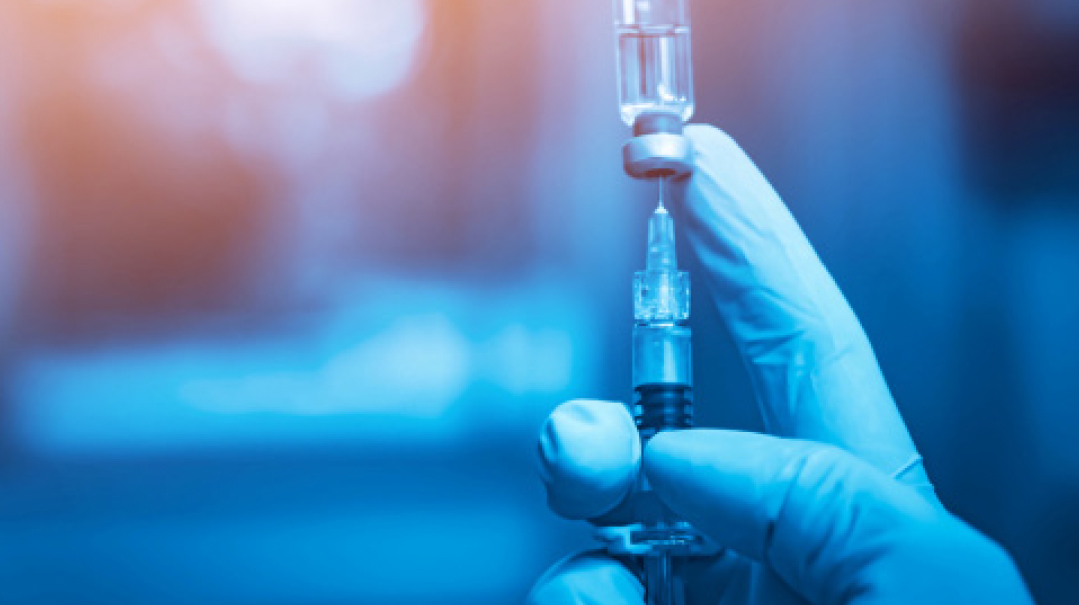Covid Clarity: A Vaccine Like No Other

"As far as I’m aware, there was no sidestepping of the standard rules of vaccine development. It was just really fast"

T
he rollout of Pfizer’s COVID-19 vaccine was greeted with celebration, relief, and — for some — worry and doubt. There are a lot of questions and some skepticism about a vaccine that was developed with record-breaking speed. Is it safe? Is it necessary? Who should rush to get it, and who should wait? Dr. Michael Lederman, an immunologist, professor, and researcher at Case Western Reserve University School of Medicine, answers our questions
We know that this vaccine is different from a typical vaccine, since it’s a messenger RNA (mRNA) vaccine. What are the ramifications of that difference?
In earlier vaccines, the antigen is introduced to us either as a protein (sometimes a sugar) or as part of a virus. In this instance, the antigen is introduced through messenger RNA (also known as mRNA).
We use mRNA in our own cells to make proteins. The strategy behind this new vaccine takes the RNA sequences that encode an important protein of the virus, encapsulates it in a little fat globule, and then injects it into the muscle. Our cells then take up that sequence and translate that RNA code into a protein, and the protein that our cells make is the actual immunogen — it drives an antibody response that we use to protect ourselves.
So while earlier vaccines provided a target that is recognized by our body’s antibodies and white blood cell “soldiers” to fight infection, here we’re putting RNA into our own cells and asking those cells to make that immunogen target that is recognized by our immune antibodies and white blood cell soldiers. It’s as if we’re enlisting the body in the fight just one stage earlier than with a typical vaccine.
That’s exactly right. Ordinarily we introduce the protein immunogen inside the vaccine. In this instance we’re introducing a message that our cells make into the protein, which then induces the immune response.
We know that production of the COVID-19 vaccine was expedited, but was anything changed in the actual review process? Were the typical approval stages conducted simultaneously rather than in the usual sequential order?
No, they were done in sequence, but they were unusually fast. I don’t think anyone has developed a vaccine as rapidly as these vaccines have been developed.
The initial stages, known as Phase I and Phase II, are usually tested in a small number of people. These studies are designed to see, first of all, whether or not the vaccine is safe, and second, how much of the vaccine one needs to give to generate an immune response. In the case of the COVID-19 vaccines, those were done pretty rapidly.
Then the process transitioned into larger Phase III studies (comprising 30,000 to 40,000 participants). These determine whether or not the vaccine is clinically useful. In that regard, clinic utility is determined by preventing the occurrence of infection, and that’s what these vaccines both did, to a surprisingly high level. Also, by studying more people, you can get a better idea about how safe the vaccines are.
Besides making it faster, was there anything in the process that was expedited or changed?
Not to my knowledge. As far as I can tell, these agents were developed just really quickly. As far as I’m aware, there was no sidestepping of the standard rules of vaccine development. It was just really fast.
We’re hearing that people are worried because it was done so quickly.
Of course they’re worried. Of course, because it’s fast, and we’re in the middle of a pandemic. And there were concerns that our own government might have had a political interest in accelerating the pace of the vaccine. In fact, we know there was political incentive to announce a successful vaccine before the presidential election, and people get a little suspicious of that.
But do you feel confident that no steps were omitted from the process, and that even though it was done quickly, it was done well?
Absolutely. The data safety monitoring boards who reviewed these vaccines are made up of scientists and physicians with integrity and experience, and they reviewed the data carefully and determined that the vaccines were effective and safe.
Is the aim right now to eradicate the virus entirely, or just to supply immunity to vulnerable populations?
Well, it’s a question of priority. The Centers for Disease Control has identified priority groups. Early on, the highest priority groups are especially vulnerable individuals — like people in nursing homes and frontline health care workers who put themselves on the line to care for people who are ill.
After that, the vaccine will be rolled out to as many people who are willing to be immunized according to those priorities. Ultimately the goal is to offer the vaccine to everybody.
Right now it has not yet been approved for children under 16. Is that typical of a new vaccine?
Yes, that’s pretty standard. The vaccines for most immunizations are first tested in adults and then among children, and that’s the way it’s happening here.
I would anticipate that the vaccine will be safe and effective for children too — possibly even more effective in children, because they typically have a brisk immune response, typically more brisk than those of older people.
But what’s really interesting is that these vaccines have been tested in a whole range of individuals and even among old people, they seem to be immunogenic and protective — which is great, because as you know, the older you are, the greater your risk of getting really, really sick and dying of COVID-19.
Is there any demographic you feel should not be getting the vaccine at this point?
Well, it’s not clear how safe this is in pregnancy. Right now the rules for pregnancy and nursing really don’t exist. In addition, some people are worried about the immunocompromised. I’m not that worried about the immunocompromised, though. I don’t see a good reason for the vaccines to be particularly risky among the immunocompromised (although it may not be as effective from an immunogenic standpoint among the immunocompromised).
People who’ve had documented cases of COVID or have tested positive for antibodies may be wondering if it’s necessary for them to be immunized. Is the immunity provided by the vaccine more effective than the immunity provided by the infection?
These are great questions and the answers are not known. If you get infected with COVID, and you develop antibodies — which 95 percent of infected people do — then it looks as though either those antibodies or some other aspect of immunity generated by natural infection is protective.
What is not clear is how long that clinical protection lasts. It’s true that antibody levels fall, but that is to be expected. The immune system is what’s called “plastic” — and it has to be plastic in order to make room for the generation of new immune responses to new microbial pathogens.
When you get an infection, you generate this brisk immune response, but you can’t keep all those “soldiers” around to protect you. You need to have room for other soldiers to come in and do their jobs. So a classic immune response goes up upon exposure to the virus, and as the virus or the pathogen goes away, the magnitude of that immune response goes down. That’s what’s meant by plastic.
But there’s this phenomenon called memory, and that’s the beauty of the immune response. There are cells that remember what they have seen, and if they ever see it again, they have a memory immune response that is typically more brisk and more rapid than we see the first time. This is the scientific concept that underlies the rationale for vaccines and how they protect us.
But in terms of duration of protection, things are unknown. In our normal lives, we get boosters for vaccines like tetanus, because we know that the protection generated by a tetanus vaccine doesn’t last forever. How long it’s going to last for COVID-19, I don’t know. We definitely have memory. If this vaccine works like virtually all other immune responses, then we should have memory that’s reasonably durable. We won’t know how long it’s protective until we follow people long enough.
In that case, is it high priority for people who have antibodies from a natural infection to get vaccinated?
Another great question. I don’t think that vaccinating those with a prior COVID infection will be risky. But until this is done, we’re just not going to know for sure. It seems more likely that it could be the opposite — that having a preexisting antibody response gives you a longer and more durable memory. That wouldn’t be surprising, but until that’s done, you just don’t know.
I’m quite confident that the people who are immunizing are going to be examining whether or not preexisting antibodies confer any particular risk or any benefit to the response to immunization.
Personal question: Are you planning to take the vaccine?
Absolutely. I will take it as soon as I am up for it. As soon as my demographic is a candidate for it, I will be immunized.
Imagine you had a hypothetical 25-year-old daughter who is engaged to be married and hoping to start a family. Would you recommend that she take it, or would you wait for more studies?
If she’s planning to start a family right now, that becomes uncertain. But based upon the survival of the immunogenic RNA in our cells, I’d be terribly surprised if these vaccines had a bad impact on either pregnancy immediately after inoculation or on pregnancies later on.
I’d be very surprised if there would be any real issue with getting pregnant a couple of months after immunization. I shouldn’t think that would be an issue. So personally, I don’t think I would hesitate to recommend that this hypothetical daughter get vaccinated — but you could pull a number out of the air and say wait a few months before pregnancy.
We’ve been hearing that masks are here to stay even after immunizations. Can you explain that?
Absolutely. For the time being, the masks are here to stay for a variety of reasons. The rollout of the vaccines will continue for months and months, and we are not going to get to herd immunity until an estimated 70 percent of the population is immune.
Two, even after vaccination, we’re not sure that you’ve gotten a good immune response. The estimates of protection range from 90 to 95 percent, so 5 to 10 percent of those vaccinated may not acquire antibodies — and that’s a population that’s basically healthy.
But then there are also the immunocompromised, people who are on biologics for treatment of medical illness and autoimmune diseases who may not develop a good antibody response when immunized. So until this pandemic gets under control and we have sufficient herd immunity, we need to look to protect everybody.
When do you see the masks coming off?
Well, it all depends on how good the rollout is. And that in part depends upon production, distribution, logistics, and acceptance. In the United States, there are a lot of people who are very uneasy and concerned about toxicities and adverse experiences due to immunization. And there’s a whole anti-vax movement that is very worried about these things.
Much of this is based on misinformation and on research papers that have been withdrawn for fraud. But there is no question that there are rare, potentially serious side effects with the vaccines that we’ve had available for years. So it’s dishonest to deny that vaccines can cause side effects. But on balance, the benefits of vaccines to a society are enormous and far exceed the risks.
When I was a kid, schoolmates of mine had had polio and were partially paralyzed because of it. Polio is rare in the United States now because of vaccines. Smallpox, which used to kill about one in three who got it and left most others terribly scarred, has been eradicated globally because of vaccines. And all these other diseases — measles, German measles (rubella), which used to cause terrible birth defects — you don’t see those in the United States anymore, and that’s all because of the success of vaccines.
When you mention anti-vax sentiment, it’s important to remember that usually the fear is prompted by parents worried about keeping their kids healthy. It’s possible that they are being manipulated by others with more nefarious agendas, but when it comes down to the individual decisions, it’s just parents trying to protect their kids. And when respected doctors and medical professionals brush off their concerns as quackery or conspiracy theories, they feel unheard and disrespected, and it doesn’t serve the cause of science.
You’re absolutely right. People do worry about their kids and they don’t want to put their kids at risk. And that’s why things get complicated, because at some point we have to make a decision if we all share the risk together, or whether or not we are prepared to live a life where we let other people take a risk to protect us but we don’t contribute to that effort.
From a perspective of ethics and moral behavior, I think an argument can be made that we should all try to be in this together. And a person who says, “You know, all these other kids in my neighborhood are getting the MMR vaccines, and there are rare side effects to the MMR, I don’t want to put my kid at risk, so I’m going to let all the other kids take the risk so that my kid will be protected” — I think there’s a problem with that.
With COVID, the argument becomes stickier, because parents are saying there might be some unknown risk with the vaccine, while most kids who get COVID do fine. So that whole moral argument gets a bit sharpened.
You’re right that the risk of serious illness among children is very low. But we’ve had deaths in infants due to COVID. They are rare, but it does happen. I think that public health officials and epidemiologists are going to have to make a decision at some point as to how broadly to recommend immunization for small children.
I suspect that immunization for children will be recommended, because it looks like these RNA vaccines are going to be really safe. They have been studied in populations of thirty to forty thousand, and at least in the short term — which is all we know — there don’t seem to be serious adverse experiences. There are local reactions and rare hypersensitivity reactions, usually in persons who’ve had hypersensitivity reactions earlier to foods or medicines, but nothing that would raise any eyebrows. Is it likely that there will be long-term consequences? I don’t think so, but until you get to the long term, you’re just not going to know for sure.
These two COVID-19 mRNA vaccines that have received Emergency Use Authorization (EUA) in the United States are remarkably effective and very safe. On the other hand, the risks to remaining unvaccinated are high. If we want to see an end to this COVID-19 pandemic that has killed millions already, devastated economies, and disrupted all our lives, vaccines are the way out. The sooner enough of us are safely immunized, the sooner this nightmare will end.
Michael M. Lederman, MD, is professor of medicine and professor of pathology, microbiology/molecular biology, and biomedical ethics at Case Western Reserve University School of Medicine and University Hospitals/Cleveland Medical Center. He is credited as author on more than 400 peer-reviewed research publications and has been elected to the Association of American Physicians (AAP) and to fellowship in the American Academy for the Advancement of Science (AAAS), the American Academy of Microbiology and the Infectious Diseases Society of America (IDSA). He is editor in chief of Pathogens and Immunity.
(Originally featured in Mishpacha, Issue 841)
Oops! We could not locate your form.












